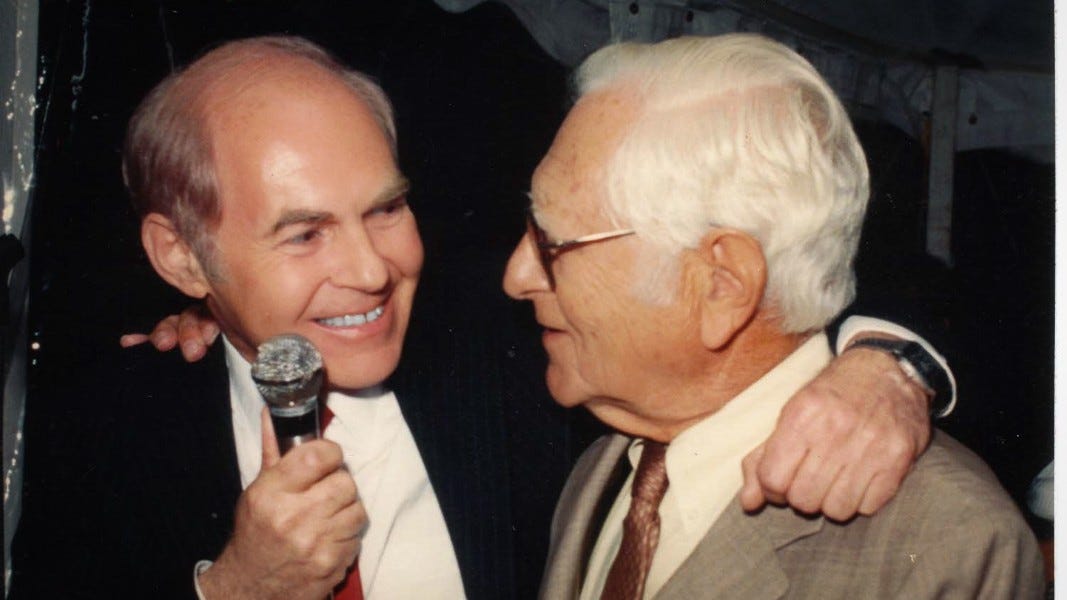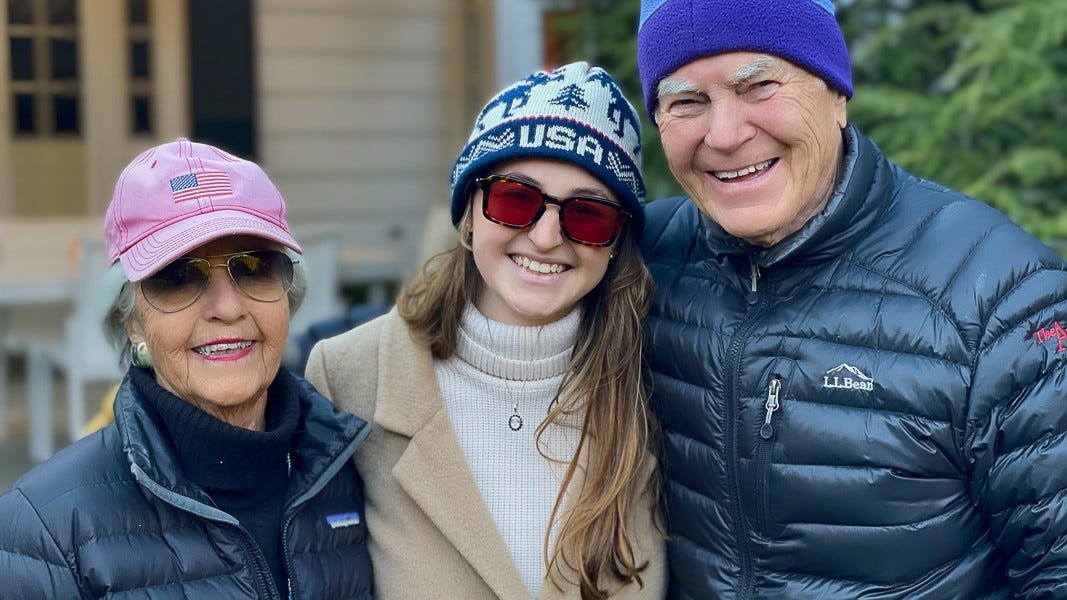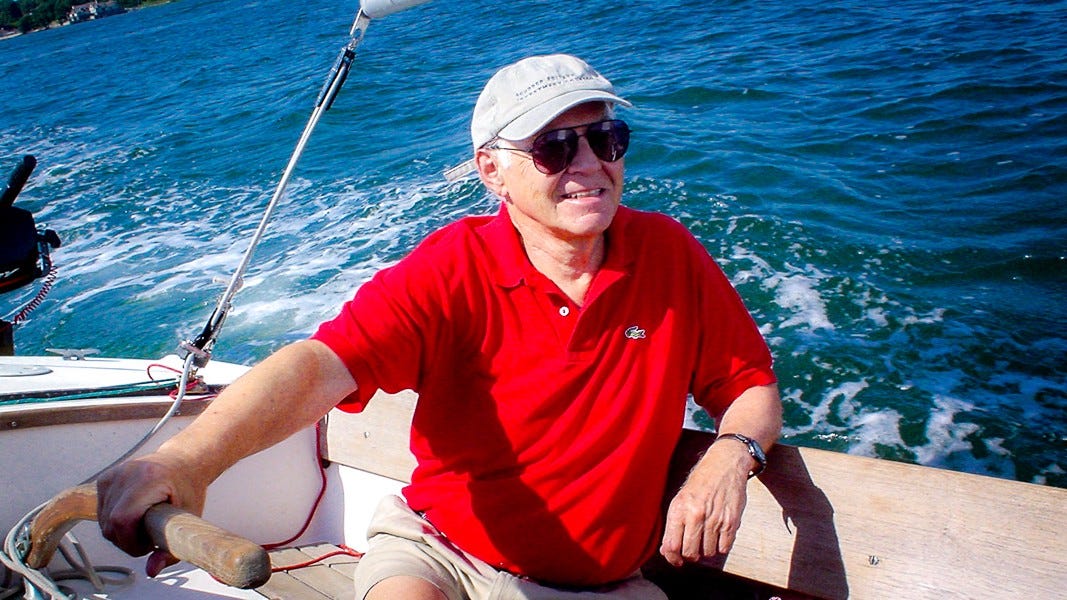Week 24.20 Ninety Lessons
Last week, my father turned 90. We are fortunate that he is in excellent mental and physical health, and he and my mom are independent, active, and still enjoying life to the fullest. As our extended family celebrated his birthday over the weekend, I reflected on a life well-lived, of time well-spent, and the return on investment from seeds planted decades ago. As I pondered these thoughts, I realized that the way we love is a reflection of how we live, and there are valuable lessons to be learned from my father's nine decades of experience.
One of the most important lessons I've learned is to love and be loved, in that order. This concept, which I learned from Alan Mulally and Francis Hesselbein, applies perfectly to my father. As my children, grandchildren, wife, and sister shared their memories and experiences with my father during their short toasts, the fullness of his life was revealed. He had found a way to show his love uniquely with each person and was loved back in kind. By loving first, he created a safe space for sharing information, helping and being helped, and inspiring those in his circle to follow his example.
Another critical lesson is the importance of relationships. My father's primary relationship is with my mother, and he is quick to acknowledge it. They met when they were 15, married at 21, and have been together ever since. She is his rudder and keel, keeping him directionally sound and balanced. He also established many lifelong relationships with childhood friends, early career collaborators, and through new activities he pursued later in life. His friends have nourished him throughout his life and continue to do so daily. He is rarely at a loss for things to do, people to see, or conversations to be had. Most tellingly, I cannot think of many relationships that he ever lost, except to age and disease. I am sure that he encountered the same issues that everyone does, but he chose to resolve them rather than hold onto them. This community of flourishing friends keeps him moving and in the flow of life.
My father has taught me to appreciate every day. Although my grandfather lived to 102, my father never took a single day for granted. Whether it was taking an interest in his grandchildren, children, relatives, or friends, he was always active and knew that any day he could give something to someone was a gift to himself. When he found a bakery that he loved, his first impulse was to buy many loaves and drop them off with those he loved, sometimes for weeks on end. He made special days regular and regular days special, masterfully creating annual events out of normal activities.
In life and leadership, we can find lessons everywhere, but perhaps nowhere more nutrient-rich than from those who have traversed many decades. My father, born and raised in Fairfield County, CT, entered the world between WWI and WWII and witnessed post-war American prosperity, the cultural changes of the 60s, and the national and global changes ever since. He traveled the world but kept his roots in place, enriching those around him as he grew. A leader in business, but more importantly in life, my father's 90 years have been filled with cherishing those he loves and leads. These are lessons worth taking to heart, both for ourselves and for those we love and lead. By embracing the wisdom of a life well-lived, we can create a legacy of love, connection, and appreciation that will endure for generations to come.
With love, gratitude and wonder.
Scott
Where Structure Meets Flexibility: How The Six-Quarter Walk Will Guide Your AI Strategy by Charlene Li
In her post, Charlene Li introduces the concept of the "Six-Quarter Walk," a structured yet flexible approach to developing an AI strategy. This method involves envisioning where AI will create value for an organization over the next 18 months, considering factors such as future customer expectations, new capabilities, and potential changes in willingness to pay. The plan is then broken down into quarterly goals, mapping out the necessary skills, data, technology, processes, and partnerships required to achieve the vision.
Li's compelling approach offers a pragmatic solution for organizations navigating the rapidly evolving AI landscape. By balancing structure and flexibility, the Six-Quarter Walk empowers leaders to adapt their strategies as needed while working towards their long-term goals. To learn more about developing a winning generative AI strategy for competitive advantage, readers are encouraged to attend Charlene Li's upcoming free webinar on Wed. May 8th at 10 am PT, Developing a Winning Generative AI Strategy for Competitive Advantage. This hour-long session promises invaluable insights and best practices that will help organizations harness the power of AI to drive success in the coming years.
Why The Launch Point Can Feel Like Waiting Around In The Lobby Of Your S Curve by Whitney Johnson
In a recent episode of Disrupt Yourself, Whitney Johnson spoke with Eduardo Briceño, the co-founder and CEO of Mindset Works and author of 'The Performance Paradox'. Eduardo shared his personal struggles with speaking to others, recounting how he would feel anxious about recess and tried to remain invisible, finding comfort in ideas, facts, and logic. This is a classic symptom of staying too long in the learning zone, watching from the sidelines.
Eduardo's shift into the performance zone happened during grad school, in a popular class called Interpersonal Dynamics. Despite his intellectual interest in the conversations, Eduardo remained an observer until another student asked about his decision not to have children. This question triggered an emotional response, causing Eduardo to burst into tears. From that moment on, he experienced a change in his body, with emotions and energy needing to be released. Today, Eduardo has given multiple TedX talks, demonstrating his growth and ability to overcome his fears of speaking to others.
Just add water? The fascinating prospect of “instant intimacy.” by Rita McGrath
In today's rapidly evolving workplace, creating a more human and engaging environment is crucial for employee satisfaction and organizational success. Employee engagement remains a significant challenge, with only a small percentage of workers worldwide feeling truly invested in their work. To address this issue, companies must prioritize creating a sense of purpose, providing opportunities for growth and development, offering recognition and feedback, and allowing employees to capitalize on their strengths.
Keith Ferrazzi, an expert in networking and team-building, emphasizes the importance of "teamship" in the modern workplace. With the shift towards shorter-term projects and fluid team structures, traditional team-building methods may no longer be effective. Instead, leaders must foster "instant intimacy" and quickly establish trust among team members. Ferrazzi's research indicates that teams engaging in purposeful bonding activities, such as regular check-ins to discuss energy levels and personal challenges, can significantly improve their relational bonding scores. This increased trust and candor among team members is essential for driving high performance and achieving organizational goals.











